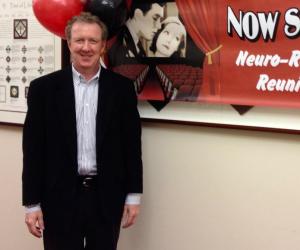Finding Meaning & Connection in Recovery
In 2011, a motorcycle accident left Greg Nordfelt with a traumatic brain injury and multiple broken bones. When he rejoined the world after 11 days in and out of coma and nearly a month of memory loss, Greg found himself radically changed. But Greg’s story isn’t one of loss and pain. Instead, it’s a story of incredible gain. When he recovered full consciousness, Greg had a newfound focus on love, connection, and gratitude—a focus he was inspired to bring to his relationships at home and work, with incredible results. Now, as a motivational speaker, he brings his experience into the workplace to help both medical and corporate professionals benefit from his hard-won knowledge.
Chapter 1
Where Am I & How Did I Get Here?
Did you know that you can have “good coma” days and “bad coma” days? You can—and I’d just had a bad one. It was Thursday, August 18, 2011, and I’d been in a coma for four days. The previous day, Wednesday, had been a “bad coma” day. My neurosurgeon, Dr. William Ganz, had slapped his hands together in front of my face and tapped on my sternum—all in hopes of getting a response. But nothing. I was non-responsive.
But this was a new day—Thursday. I lay propped up in bed in an intensive care unit, with my wife, Laura, at my side.
Suddenly, I opened my eyes.
I started actually scanning the room, trying to take in and make sense of my surroundings. I noticed my leg sticking out in front of me, wrapped in a bulbous bandage. I was covered in wires and tubes and surrounded by machines. I looked straight ahead at the wall. Then I panned to the left, where I saw a nurse standing at the corner of my bed. She was a stranger to me, and I found myself trying to grasp who she was. And then I tried to figure out where I was.
Everything was odd to me, and I couldn’t make sense of it.
“What … the … fudge …?”
Only, I didn’t say “fudge,” of course; I dropped the actual F-bomb. “The queen mother of all dirty words,” as Ralphie says in A Christmas Story. Not exactly the kind of language I’d use in polite company.
To my right, Laura immediately busted up laughing. It was a humorous moment that she needed dearly in the midst of a very intense situation. Even the nurse joined in, though I’m not sure she appreciated my strong language, given the prevalence of deep religious conviction in Idaho, where I’d landed myself in the hospital. (My sister, Debbie, who is Mormon and was my greatest protector growing up, later insisted that my foul language was the result of my head injury.)
Laura didn’t mind, though. “He’s baaaack,” she said, laughing and relieved.
Of course, I wasn’t really back. Not completely. The nurse conducted a physical assessment, which I passed—I could squeeze her hand and wiggle my toes. But from a neurological perspective, I was whacked.
“What’s your name?” the nurse asked.
“Beauford.”
“Where are you from?”
“North Carolina.”
“What’s your wife’s name?”
“Suzy.”
Hm. Considering that my name is Greg, I live in Salt Lake City, Utah, and my wife’s name is Laura, it appeared that I had a long way to go. I was in between zones, not really here and not really there. One moment I was in reality; the next moment, I was back in my happy place. But Laura had seen me scanning my environment, gathering bits of information; this first moment was the start of a journey in healing, and also, though I didn’t know it at the time, my journey toward discovering a new self.
The old Greg was gone.
Join Greg’s email list and be the first to get updates about his new memoir.



